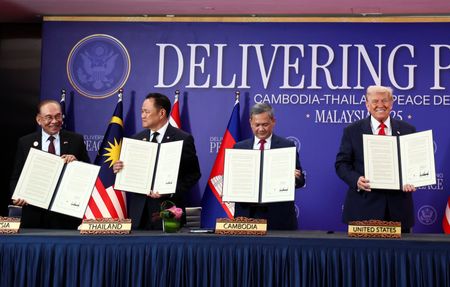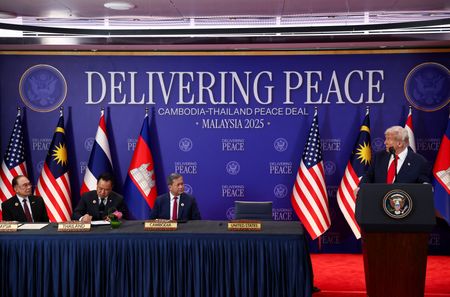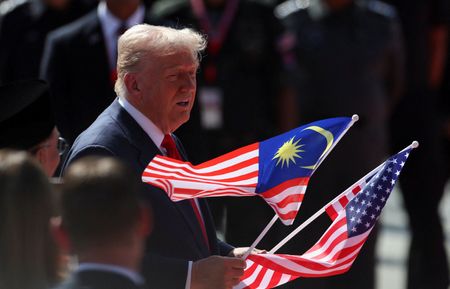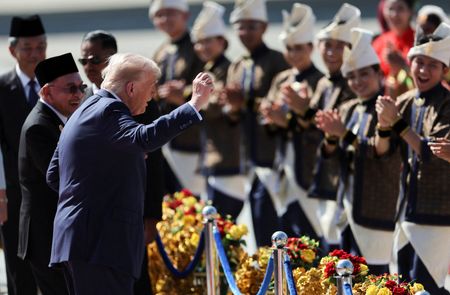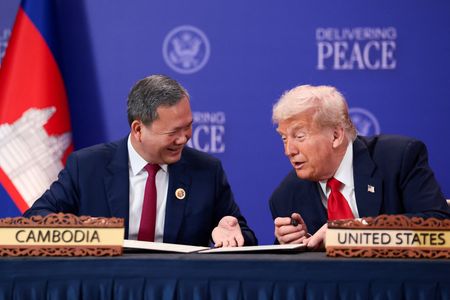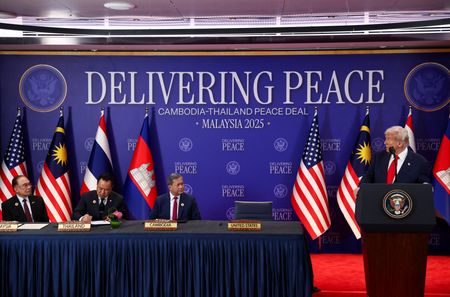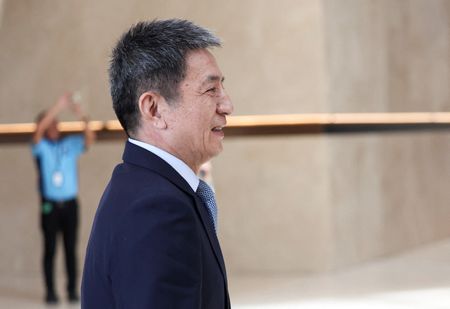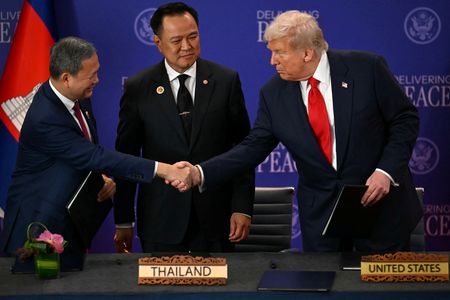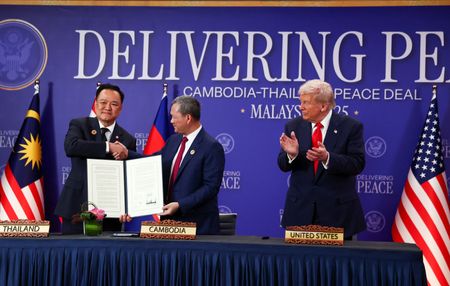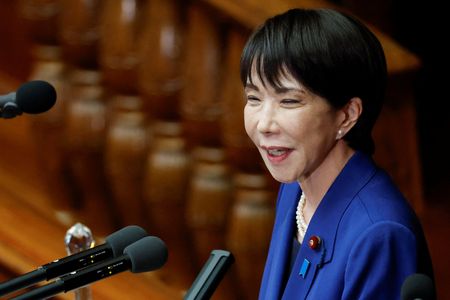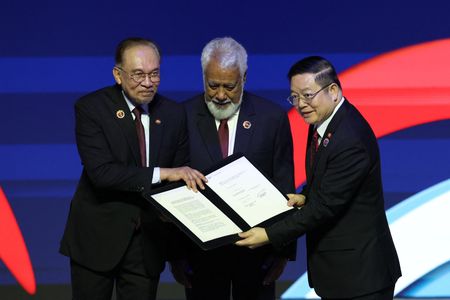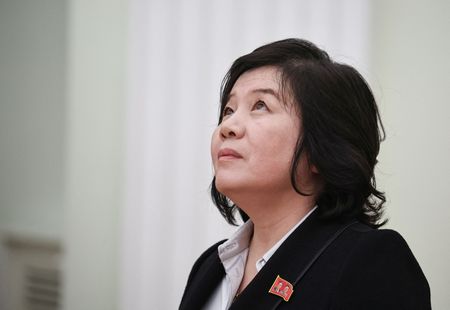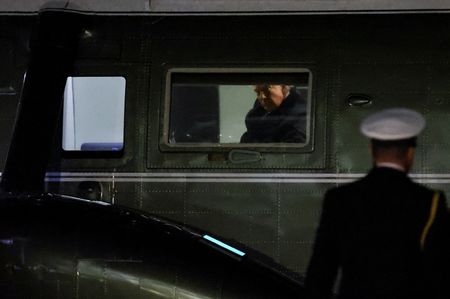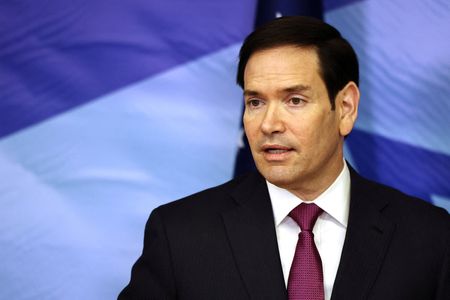By Trevor Hunnicutt and Rozanna Latiff
KUALA LUMPUR (Reuters) -The leaders of Thailand and Cambodia signed an expanded ceasefire deal on Sunday watched over by U.S. President Donald Trump, who landed in Malaysia for the ASEAN Summit and to oversee a series of pivotal trade talks.
Thai Prime Minister Anutin Charnvirakul and his Cambodian counterpart Hun Manet signed the agreement at a ceasefire ceremony in front of a backdrop covered in U.S. insignia and the words “Delivering Peace”, building on a truce signed three months ago.
“This declaration, if fully implemented, will provide the building blocks for a lasting peace, but more importantly, it will begin the process of mending our ties,” Hun Manet said.
“Our border communities have been divided by conflict, and innocent civilians have suffered immense losses.”
Trump helped broker an end to the five-day conflict in July by calling the then-leaders of the two countries and urging them to end hostilities, their worst fighting in recent history, or risk their respective trade talks with Washington being put on hold.
“The United States will have a robust commerce and cooperation, transactions, lots of them, with both nations, as long as they live in peace,” Trump said.
CHINA NEGOTIATIONS
On arriving in Malaysia, Trump was greeted by Prime Minister Anwar Ibrahim and a troupe of ceremonial dancers at Kuala Lumpur International Airport. He stopped on the red carpet to dance with the performers before taking a U.S. flag in one hand and a Malaysian flag in the other and jumping into his limousine to travel to the city with Anwar.
As Trump mingled with other leaders, U.S. and Chinese negotiators met on the sidelines to avert further escalations in a trade war between the world’s two largest economies.
U.S. negotiators said the meeting had built a “successful framework” ahead of talks between Trump and Chinese President Xi Jinping in South Korea next week.
“I think we’re going to have a deal with China,” an optimistic Trump told reporters at the sidelines of the summit, while China’s negotiators said they had reached a preliminary consensus.
China’s stranglehold over global supplies of rare earths is at the heart of the negotiations, and Washington has sought to diversify supply chains.
Within hours of landing in Malaysia, Trump had finalised trade agreements with four countries, including deals involving critical minerals with Thailand and Malaysia, amid competing efforts from Beijing in the rapidly growing sector.
TRADE DEALS
Malaysia on Sunday agreed to refrain from banning or imposing quotas on exports to the United States of critical minerals or rare earth elements, the countries said in a statement. They did not specify whether Malaysia’s pledge applied to raw or processed rare earths.
He also announced a wider trade deal with Cambodia while the White House said an agreement had also been reached with Vietnam to allow “both countries’ exporters unprecedented access to each other’s markets”.
The U.S. would maintain a tariff rate of 19% on most exports from Malaysia, Thailand and Cambodia, while a 20% rate on Vietnam will also be retained, the White House said.
To the leaders of one of the regions hardest hit by tariffs, Trump said: “Our message to the nations of Southeast Asia is that the United States is with you 100% and we intend to be a strong partner for many generations.”
Trump also held a brief meeting with Brazilian President Luiz Inácio Lula da Silva, who is among several world leaders attending the summit.
Lula will aim to lower 50% tariffs imposed by Washington on Brazilian goods.
A meeting with Canadian Prime Minister Mark Carney was not on the cards after talks between the neighbours came to an abrupt end. Trump said on Saturday he was increasing tariffs on Canada by an additional 10% “above what they’re paying now”.
EAST TIMOR BECOMES NEWEST ASEAN MEMBER
Asia’s youngest nation East Timor became the 11th member of the ASEAN bloc on Sunday, fulfilling a vision set out by its current president nearly a half-century ago while the country was a Portuguese colony.
Also known as Timor-Leste, the country of 1.4 million people is among Asia’s poorest and hopes to see gains from integrating its fledgling economy, which at about $2 billion represents only a tiny fraction of ASEAN’s collective $3.8 trillion gross domestic product.
East Timor’s accession follows a 14-year wait and though its membership is not expected to be transformative, it represents a symbolic victory for its President Jose Ramos-Horta and Prime Minister Xanana Gusmao, the heroes of its struggle for independence.
“For the people of Timor-Leste, this is not only a dream realised, but a powerful affirmation of our journey,” Gusmao said in a speech.
“Our accession is a testament to the spirit of our people, a young democracy, born from our struggle.”
(Reporting by Rozanna Latiff and Trevor Hunnicutt; Additional reporting by Danial Azhar and Yukin Zhang; Editing by Kate Mayberry)

